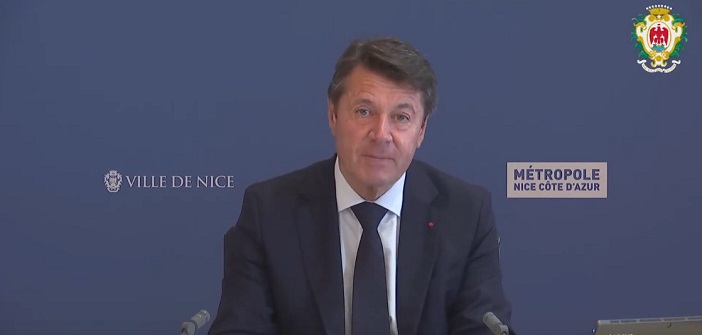The session of the Municipal Council didn’t lead to the clashes that often characterize debates. It’s true that the opposition, unable to “weigh in” on the approval of resolutions, can only find a means of expression in discussions. However, it must be acknowledged that for some time now Christian Estrosi has also shown restraint, which contributes to the peaceful conduct of the agenda. And besides, everything took place remotely, and physical distance helps to avoid contact…
The administrative issue (management statement, administrative account, allocation of the main budget results, and annexes) was handled smoothly, showcasing effective financial management and control of operating costs, despite the disruptive effects of the health crisis on the local economy. Informed of updated results from the vaccination campaign, which managed to keep indicators below the alert threshold (incidence rate 45/100000, positivity rate 1.1) and vaccinated more than 165,000 people from Nice and 262,000 people in the metropolitan area, the Municipal Council was able to examine a substantial number (125) of resolutions, many routine but some quite significant.
A first novelty, even though it’s not an absolute first, is Philippe Vardon (RN) highlighting precedents in municipalities governed by mayors from his party (“Indeed, whether in Béziers, Le Pontet, or Fréjus for example, municipal mutual insurance plans have been implemented, sometimes as early as 2014”), announcing the creation of a municipal mutual insurance from which economically disadvantaged people in Nice could benefit. “In a spirit of solidarity towards the less fortunate, I wish to propose a municipal mutual insurance plan to the people of Nice, in conjunction with the CCAS_Nice, to ensure access to healthcare for unemployed young people, seniors, the unemployed, and some employees,” the Mayor of Nice presented this initiative.
Still concerning “public health,” the Mayor of Nice announced the upcoming establishment of a Health Hub in Plaine du Var, with a clinic from the Kantys group (the same that recently acquired Villa Paradiso to create an oncology unit) to enhance healthcare coverage in the east of the city, particularly the Eco-Vallée, including nearby towns like Carros. To achieve this, the city will transfer the land unit currently occupied by the horticultural production center in the Arboras neighborhood.
A small dialogue of the deaf ensued between Christian Estrosi and the ecologist Juliette Chesnel Le Roux, who, while approving of the initiative, objected to the location and announced a dissenting vote: “Yes, to address the need for healthcare access for the residents of the valleys and both banks of the Var. But let’s reconsider with ARS on less invasive land structures: we request that the project not be located on fertile land!”
To this, the Mayor of Nice responded with the facts: upon completion of the OIN, agricultural and green spaces will cover 124 hectares, a greater area than before.
Moving to cultural issues, the Municipal Council approved, this time unanimously, Nice’s candidacy for European Capital of Culture 2028, a year in which France will receive one of the two titles, the other reserved for a city in the Czech Republic. For the record, Nice had been a candidate in 2013, but Marseille won the “crown.” Having chaired Nice’s candidacy for UNESCO World Heritage status, former Minister Jean-Jacques Aillagon, whose competence and renown are universally recognized, will again oversee the application. The Government will decide in 2023.
It was also announced that a study will be launched to assess the possibility and conditions for the shared management between the Opera and TNN of the Diacosmie.
Regarding housing policy, an interesting initiative is the provision for mixed rental for students/tourists: essentially, after nine months of renting to a student, the owner can rent their property to a tourist for three months. However, permit conditions will be tightened, and disturbances to public order will become a suspensive condition.
Two resolutions concerned Christian Estrosi’s ambition to make Nice a greener city. They involve acquiring land for the development of the Great Landscape Park in Plaine du Var and the so-called Universities Park in Nice Méridia. Once again, some friction arose between the Mayor of Nice and his deputy Pierre-Paul Leonelli and the ecologist Sylvie Bonaldi, who provocatively commented on the resolution’s text: “The stated goal is to reclaim nature and ‘continue greening the city.’ Coluche would make a sketch about it: greener than green!”. And she added emphatically (Madame Bonaldi is an activist, and it shows!): “But it’s mostly about communication! It’s only about sparing at least 30 hectares from urbanization! The Plaine du Var has witnessed violations of the agricultural land use and the blooming of truck parking lots or warehouse park landscapes,” before asking Christian Estrosi to “restore order and enforce the rules.” What an atmosphere!
The long-presented redevelopment project for Gambetta Boulevard (with the appendage of Céssole Boulevard and the outlet to the Promenade des Anglais providing for reduced car traffic and favoring bike lanes and dedicated public transport, widening sidewalks to benefit commerce, embellishing the route and Franklin Square) has reached its conclusion after a very favorable public consultation report. Despite the strong critical opposition from council member Geneviève Borgo di Pozzo (on behalf of the RN group), a staunch defender of motorists’ rights and against the removal of car lanes, the project will become a plan and its implementation will take place in the coming years.
The next session is on Monday at the Metropolitan Council (the main actors are virtually the same).


